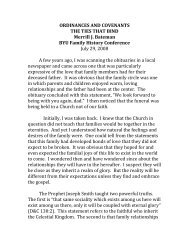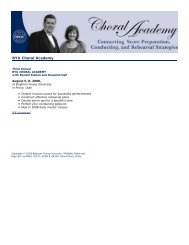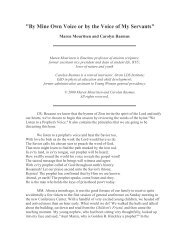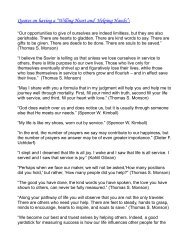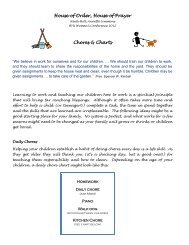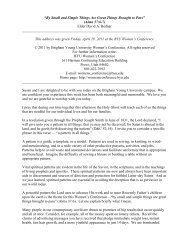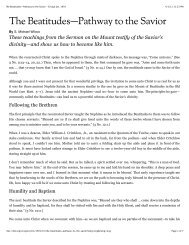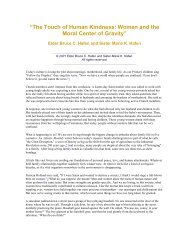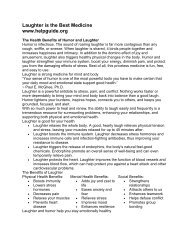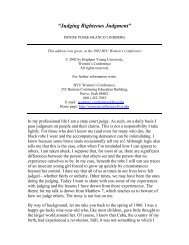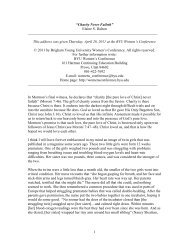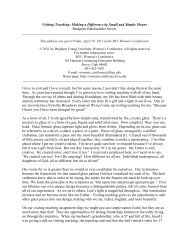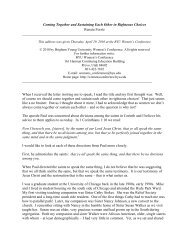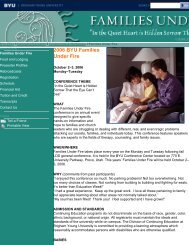Elaine Marshall - Continuing Education - Brigham Young University
Elaine Marshall - Continuing Education - Brigham Young University
Elaine Marshall - Continuing Education - Brigham Young University
Create successful ePaper yourself
Turn your PDF publications into a flip-book with our unique Google optimized e-Paper software.
“According to the Own Due time of the Lord”<br />
ELAINE MARSHALL<br />
This address was given, at the 2002 BYU Women’s Conference<br />
© 2002 by <strong>Brigham</strong> <strong>Young</strong> <strong>University</strong>,<br />
Women’s Conference<br />
All rights reserved.<br />
For further information write:<br />
BYU Women’s Conference,<br />
352 Harman <strong>Continuing</strong> <strong>Education</strong> Building,<br />
Provo, Utah 84602.<br />
(801) 422-7692<br />
E-mail: womens_conference@byu.edu<br />
Home page: http://womensconference.byu.edu<br />
I have a timing dysfunction. I’ve come to believe that timing is a talent or<br />
gift, probably distributed at some meeting I missed. The problem is best<br />
expressed in my inability to get on or off an escalator. It doesn’t seem<br />
natural to me that stairs should move. When I was young, it didn’t matter.<br />
The only escalator in my universe was at Grayson’s Department Store on<br />
Washington Boulevard. But now, they are everywhere—at airports, in<br />
hotels, in subway stations. I can’t tell when to get on and when to get off. I<br />
stand and wait, and rock back and forth, and hesitate. Everyone in my family<br />
has tried to help. My son Chad once rocked with me, saying gently, “Mom,<br />
you can do this.” My husband says with veiled impatience, “Just close your<br />
eyes and step on!”<br />
This disability has been confirmed by other events on the conveyor belts of<br />
my life. Those moving steps of life seem to come too early or too late, and I<br />
often trip to get on or off.<br />
Timing<br />
Earlier this year, I heard Elder Dallin Oaks give a devotional address that<br />
spoke to my heart. His subject was timing. He said, “We cannot have true<br />
faith in the Lord without also having complete trust in the Lord’s will and
the Lord’s timing.”1 Elder Oaks addressed one of my most serious personal<br />
theological issues. I have spent my entire life both questioning and<br />
marveling at the unfolding of the “due time of the Lord” (1 Nephi 10:3). I<br />
sometimes perceive divine timing as either heavenly interference with my<br />
personal plan or endless waiting on the Lord for something I think I deserve<br />
now.<br />
As members of the Church, we know the commandments. We are goal<br />
oriented, and we believe in working out our salvation. “We live in a world of<br />
quick fixes and instant gratification.”2 We’re drawn to day planners and<br />
hand-held computers. We sometimes think we know and may even deserve<br />
specific blessings at scheduled times, that our lives should unfold in a selfprescribed<br />
order. When we quarrel with the Lord’s timing, it’s usually<br />
because we think events come too early or too late.<br />
As a young woman growing up, I had only one plan: to marry and have<br />
children immediately. Some of my best friends married their prom<br />
sweetheart right after high school. I didn’t even have a date for prom. I<br />
waited. I went to college. My twenty-first birthday came. I was still dateless.<br />
My younger sister was already married. Then things turned around. I<br />
graduated from nursing school and applied to graduate school. I was<br />
accepted with a full-tuition scholarship that included a generous living<br />
allowance. I even enjoyed a few dates. I thought the Lord finally understood<br />
my plan.<br />
During the summer of my twenty-fourth year, as my second younger sister<br />
was making wedding plans, I was packing for graduate school. I had a<br />
boyfriend, but my timing dysfunction was in full bloom as we continued a<br />
sort of approach-avoidance relationship. But I was hopeful. Then, on a<br />
Tuesday evening, my bishop called me to go on a mission. As I pictured<br />
myself giving up my scholarship, going away for a year and a half, coming<br />
home older than a quarter century and totally dateless, it was all the wrong<br />
time! “Why didn’t he call me when I was twenty-one?” I whined.<br />
As I prayed for direction, however, I knew I must go. So I declined the<br />
scholarship, put my affairs in order, and served with faith and abandon in<br />
Colombia, South America. I never looked back and have never regretted that<br />
decision. My mission became one of the defining events of my life.
Six years ago, a gentlemen caller came in a relentless pursuit of marriage—<br />
at the wrong time, I thought. Why didn’t I meet him at the prom thirty years<br />
earlier? Why not twenty years later, so we could waltz into retirement<br />
together? But we married, and he has become the love and light of my life—<br />
my eternal life.<br />
Still, my timing dysfunction continues. No matter how much I study and<br />
prepare and repent and try again, I seem not quite ready for what’s coming<br />
next. Just as I achieved the status of professor and began my dream to be a<br />
scholar—spending time reading, writing, and sharing with adoring students<br />
at my feet—I was called to be a dean. My days are now filled with people<br />
and policies and decisions that never appeared in my academic plan.<br />
I found comfort in the fact that my children are launched (sort of—I keep<br />
coming home to dirty dishes, and they keep coming home with laundry) and<br />
my Church assignment was relatively light—until eighteen days ago. Sisters,<br />
you are looking at the least likely, most inexperienced, perhaps most<br />
untimely, new ward Relief Society president! When my bishop extended the<br />
calling, the immediate response from both my husband and me was that this<br />
was not our time. But we could not deny the inspired faith of our bishop and<br />
the sweet and powerful comfort of the Spirit, and we were compelled to<br />
recognize, for reasons beyond our knowledge, that this may be “the Lord’s<br />
own due time.”<br />
Elder Neal A. Maxwell warned, “When we are unduly impatient with an<br />
omniscient God’s timing, we really are suggesting that we know what is best<br />
. . .—we who wear wristwatches seek to counsel Him who oversees cosmic<br />
clocks and calendars.”3 When we are impatient, “we are suggesting that we<br />
like our timetable better than God’s.”4<br />
Life Doesn’t Happen in Chronological Order<br />
I am going to say something that may sound contrary to logic. Sisters, “life<br />
doesn’t happen in chronological order.” What I mean is that life is not like a<br />
string in a single, flat dimension with knots tied at assigned distances. Much<br />
of what teaches us most in life is not self-scheduled. Life is<br />
multidimensional, dynamic, and eternal. It includes our life before, the pastpresent-and-future<br />
of this life, and our life after, with overlapping and<br />
interacting events and people and reminders of the divine.
Life’s most precious moments do not happen and are not remembered or<br />
cherished according to a specific time clock. When you think about the most<br />
important events in your own memories, I don’t think you stop to arrange<br />
them in chronological order. Your past life flows in your memory without<br />
time: you think of the birth of your last child, your own first day of school, a<br />
kiss from your grandmother. You don’t care in what order they happened. In<br />
our hearts and memories timing, does not matter. As we reflect on our lives<br />
in a larger perspective, time is neither linear nor measured.<br />
One reason to live in obedience and repentance today is to sweeten our<br />
future memories. When we step back, our picture of life includes so much<br />
more than our trials of today or impatient hopes of tomorrow.<br />
When you do family history, when you make that marvelous discovery of<br />
your great-grandmother’s father, do you care whether his mother was twenty<br />
or thirty-five when he was born? Of course not! You care that you found<br />
him. Even if he lived in 1786, he is part of your family now. Time blends<br />
together as hearts are turned to each other across time and generations.<br />
I need only try to interpret Isaiah or John’s Revelation to know that my<br />
measures of time are irrelevant. Without our help to figure it out, the Lord is<br />
aware of His Kingdom and the events in our lives.<br />
Waiting, Patience, and Hope<br />
Unplanned events in our lives are not always too early. Often, our greatest<br />
trials are when we must wait. And, sometimes the waiting seems like<br />
forever. Mark Twain said, “All good things arrive unto them that wait—and<br />
don’t die in the meantime.”5<br />
Remember Sarah of the Old Testament? The Lord told Abraham, “And lo,<br />
Sarah thy wife shall have a son” (Genesis 18:10). “Sarah laughed within<br />
herself, saying, After I am waxed old . . . ? And the Lord said unto Abraham,<br />
Wherefore did Sarah laugh . . . Is any thing too hard for the Lord? At the<br />
time appointed I will return unto thee, according to the time of life, and<br />
Sarah shall have a son” (Genesis 18:12–14). “And the Lord visited Sarah as<br />
he had said, and the Lord did unto Sarah as he had spoken. For Sarah<br />
conceived, and bare Abraham a son” (Genesis 21:1–2). We are promised in<br />
modern scripture that “all things must come to pass in their time” (D&C<br />
64:32).
Waiting is a part of the challenge of mortality. We may think that we need<br />
only to endure our storms of life. Sometimes the trial of our faith is waiting<br />
itself. Waiting for a child to return to faithfulness, waiting for an uncertain<br />
diagnosis, waiting to marry—all of these uncertainties try our patience and<br />
our faith.<br />
Rather than recognize “the Lord’s own due time,” we may give the Lord due<br />
dates for our blessings or relief from trial. To any first mother-to-be, the last<br />
weeks of pregnancy seem like forever. She looks forward with anxious<br />
expectation of her due date. Sisters, how many children do you know who<br />
were actually born on the morning of their due dates?<br />
On the other hand, waiting can be a gift. Our sisters of the past waited on<br />
each other in childbirth. Such waiting meant gentle comfort and service. To<br />
wait for a missionary often means a commitment to supportive patience and<br />
personal preparation. To wait up at night for a child’s return is a gift of<br />
confidence and security.<br />
Patient waiting strengthens faith. The scriptures tell us, “I waited patiently<br />
for the Lord; and he inclined unto me, and heard my cry” (Psalm 40:1);<br />
“Therefore I will look unto the Lord; I will wait for the God of my salvation:<br />
my God will hear me” (Micah 7:7). Elder Neal A. Maxwell teaches, “Patient<br />
endurance permits us to cling to our faith in the Lord and our faith in His<br />
timing.”6<br />
When we learn patience and to wait, we invite hope. The Psalmist says, “I<br />
wait for the Lord, my soul doth wait, and in his word do I hope” (Psalm<br />
130:5). Elder Maxwell explained that “real hope is much more than wishful<br />
musing. . . . Hope is serene, not giddy, [being] eager without being naive,<br />
and pleasantly steady without being smug. Hope is realistic anticipation<br />
which takes the form of a determination—not only to survive adversity but .<br />
. . , to ‘endure . . . well’ . . . (see D&C 121:8).”7 Sisters, to endure well with<br />
hope is to anxiously engage in our own lives, to face our own life condition,<br />
submit to the Lord’s will, and to thrive. A popular poet penned, “Surviving<br />
is important. Thriving is elegant.”8<br />
An Eternal Perspective and Divine Rhythm<br />
When we learn lessons of waiting, patience, hope, and faith, we begin to<br />
gain an eternal perspective. Without such a perspective, our plans are small<br />
and uninspiring. As one author put it, we are “measuring out of life in tepid
teacups.”9 When we have an eternal perspective, we recognize the divine<br />
rhythm in our own personal lives. When we allow life to happen, embrace<br />
our own experience—whatever it is—and watch with patience the unfolding<br />
purposes of God in our lives, we are then able to claim our own lives as<br />
children of God and our relationship with a personal Savior. Otherwise, we<br />
are living for a wish for a life that is not ours. It demands a quiet courage to<br />
wait with patience.<br />
I spent my early childhood on a farm where life followed a natural rhythm. I<br />
can mark the holidays of the year by the farmwork. Between Easter (April<br />
10) and Mother’s Day (May 10), as soon as the ground thaws, my dad plows<br />
and plants. Two weeks before my birthday (March 3), calving begins. By the<br />
time the lilacs bloom, calves are “worked,” which includes branding and<br />
vaccinating. Then the cattle are herded out to range until after school starts<br />
(October 1), when they are brought back to the fields. Meanwhile, by<br />
Father’s Day, Dad is cutting, baling, and hauling hay. Every Fourth of July<br />
of my life, Dad is hauling first crop. By mid-August, the thresher is<br />
humming and the grain is harvested. By Labor Day, all of the hay is in and<br />
the cattle are held until market. Then the whole year starts over. My father<br />
and his father before him have continued this same pattern every year for<br />
more than one hundred years.<br />
Within that pattern have been droughts, bad cattle markets, hailstorms, and<br />
broken-down tractors in the field. There have been long days of enormous<br />
work and worry. There have been terrible accidents, as when my grandfather<br />
lost his leg in the hay mower, but the lilacs have always bloomed in May,<br />
and the hay is always in the barn by October. Suppose my father planned a<br />
vacation. It seems like a reasonable request. Suppose he planned his life to<br />
plant in November and harvest in March, so he could rest in June? Or<br />
suppose he prayed and pleaded for harvest in April because the wait until<br />
August was just too long?<br />
When the Lord extends His own due time, He is not withholding in punitive<br />
judgement. When we wait and submit to a divine rhythm, God may be<br />
allowing us to mature spiritually. Just as grain seed requires time to<br />
germinate and ripen, we require time to mature. We “know not” the Lord’s<br />
time (Mark 13:33). The scriptures say, “All is as one day with God, and time<br />
[is] only . . . measured unto men” (Alma 40:8); “for a thousand years . . . are<br />
but as yesterday when it is past, and as a watch in the night” (Psalm 90:4;<br />
see also 2 Peter 3:8).
The Prophet Joseph Smith taught, “When His commandments teach us, it is<br />
in view of eternity; for we are looked upon by God as though we were in<br />
eternity.”10 Even with an eternal perspective, the Lord allows miracles in<br />
our time, in the daily moments of our lives, if we are willing to see them.<br />
These miracles provoke growth spurts toward spiritual maturity.<br />
It is not always easy to gain an eternal perspective. Some trials or losses<br />
come as sudden crashing, wrenching, untimely, and unfair surprises. They<br />
hit us blindside. They challenge all sense of perspective of time or hope or<br />
even faith. Fourteen years ago, I lost my eight-year-old son, Todd, in such a<br />
jolting ambush. It’s a shock that still stings. For years, as I set one less plate<br />
at the counter, washed and folded one less stack of playclothes, passed<br />
birthdays with no cake or candles, and hung the Christmas stocking that<br />
remains empty in the morning, time did not matter. For a time, even eternity<br />
did not matter because I only knew that he was gone. I lost all personal<br />
knowledge of where he was. It didn’t matter if I died. I might have wished it.<br />
But a sweet miracle was sent after a wait of almost exactly seven years. My<br />
mother’s passing, though sudden and sad, was gentle and tender and<br />
attended by angels. She was able to share a courageous farewell with each<br />
family member and fade away in peace on Thanksgiving night surrounded<br />
by love. My father and sisters and brother and I were with her around the<br />
clock for four days. Like young children, we fluttered around her bed. We<br />
sang hymns and brought roses. We were privileged to witness a marital<br />
synchrony between Mom and Dad, a courage in my mother and a nobility in<br />
my father, of which we had never been aware. It was as if we were ushered<br />
into a new sphere of spirit—watching the intense powers of nature, as body<br />
and spirit struggled to separate under the profound influence of heaven. For<br />
four days, we lived on a different planet. We were witnesses to courage and<br />
divine knowledge as our mother willingly and bravely confronted her death.<br />
Reminiscent of a woman in the work of birth, her swollen body labored in<br />
passage across the veil separating mortal time and eternity. And we were<br />
privileged to assist as midwives. It was a profound spiritual experience to<br />
care for her, to wash her face and brush her hair, to talk to her, and to pray<br />
over her. I felt like she was, as the poet described, a “deep weathered<br />
basket,” in which I longed to linger.11 Every moment was a gift. As the end<br />
drew near, all was hushed, and we were taken away to a place of reverence.<br />
Never was there so much love or so much peace and so little matter of time<br />
in our family.
Throughout that sweet passing, I thought often of the contrast between her<br />
departure and the departure of my Todd. I learned much about “the Lord’s<br />
own due time.” I learned that God had actually waited with me in my years<br />
of grief. I don’t know why that lesson came after so long. We don’t have to<br />
understand everything about the Lord’s timing, perhaps precisely because<br />
we only have a view of mortal time. I learned that the greatest gift of the<br />
Savior and His Atonement is that He lives and we live in eternity. That is a<br />
truth, regardless of where we are in our belief or our doubt. In our mortal<br />
time, sorrows and losses will come, and life won’t happen as we hope or<br />
plan. We will suffer, sin, regret, and need to try again, and we will wait, but<br />
His gift is always there for us.<br />
Our Time Is Now<br />
If we cannot find patience for the Lord’s time, we run a great risk of missing<br />
what’s happening now. Now is our time “to prepare to meet God” (Alma<br />
12:24; Alma 34:32). Eternity includes today. We need patience not only to<br />
await blessings of hope in the future but to endure the challenges and<br />
recognize the blessings of our lives now. This is a fullness of time for each<br />
of us, every day, right now. Our past experiences have prepared us for<br />
current challenges, and our actions now will have a significant effect on our<br />
own future lives and the lives of others that we cannot begin to imagine.<br />
Late on the night of May 10, 1940, Hitler’s armies were attacking all over<br />
Europe. In England, Neville Chamberlain had resigned as prime minister, a<br />
betrayed and broken man. In the United States, Franklin Roosevelt had not<br />
yet been able to convince his country to enter what was perceived to be a<br />
European war. That night, Winston Churchill met with King George VI to<br />
form a new British government for the war; then he telephoned his friend<br />
President Roosevelt. The burden of the future of the entire world lay on the<br />
shoulders of Churchill. He said of that night, “I felt as if I were walking with<br />
Destiny, . . . that all my past life had been but a preparation for this hour and<br />
this trial.”12 Sisters, our past lives are preparation for our trials now, and<br />
how we meet today’s challenges is preparation for our future and the future<br />
of those we love.<br />
We would do well to take the counsel of President Gordon B. Hinckley, who<br />
said, “I don’t worry too much about the future, and I don’t worry very much<br />
about the past. . . . [It’s] the present you have to deal with. Reach out for<br />
every good opportunity to do what you ought to do.”13
Submitting to the “Own Due Time” of the Savior<br />
We must “remember that it is upon the rock of our redeemer, who is Christ,<br />
the Son of God, that [we] must build [our] foundation” (Helaman 5:12). The<br />
analogy of the rock of Christ is particularly significant as we think of our life<br />
plans. A rock is solid and timeless. His gift of the Atonement is timeless:<br />
infinite. Though we count time in this brief mortality, the Lord’s time and<br />
His gift are eternal.<br />
The Lord knows of our mortal temporal struggles. Even at Gethsemane, the<br />
Savior Himself “prayed that, if it were possible, the hour might pass from<br />
him” (Mark 14:35) and asked, “Father, save me from this hour” (John<br />
12:27).<br />
All of us who would be disciples of Christ kneel sometime at our own<br />
Gethsemane. But we need not stay. When we can find the courage to<br />
surrender, to accept the gift of the Savior—who already suffered there—we<br />
can stand and move on to another garden. The Atonement offers the quiet<br />
promise of that safe passage.14<br />
“The rock of our Redeemer” is timeless, infinite. The scriptures assure, “I<br />
can do all things through Christ which strengtheneth me” (Phillippians<br />
4:13); “for in his strength I can do all things” (Alma 26:12).<br />
The Lord watches over the timing and events of our lives. He knows of our<br />
waiting and its purposes. We are as impulsive children who must learn<br />
delayed gratification and the fruits of waiting in order to gain spiritual<br />
maturity. Isaiah offers a most beautiful promise: “But they that wait upon the<br />
Lord shall renew their strength; they shall mount up with wings as eagles;<br />
they shall run, and not be weary; and they shall walk, and not faint” (Isaiah<br />
40:31). “Blessed are all they that wait for him” (Isaiah 30:18).<br />
Sisters, let us live with patience and engage in work of the Lord and embrace<br />
His timing in our own lives. Let us see today as part of eternity. Let us<br />
accept the timeless gift of the Savior, the rock of our Redeemer, and come<br />
unto Him.<br />
When I become impatient and counsel the Lord with my short-sighted<br />
wishes, how presumptuous am I! How dare I question the timing of the Lord<br />
in the challenges and miracles of my life, when I can’t even get on an
escalator! I must “close my eyes in faith and step on,” in the name of Jesus<br />
Christ, amen.<br />
Notes<br />
1. Dallin H. Oaks, “Timing,” devotional address delivered at <strong>Brigham</strong><br />
<strong>Young</strong> <strong>University</strong>, Provo, Utah, 29 January 2002; available online at<br />
Http://speeches.byu.edu/devo/2001–02/OaksW02.html (retrieved 26<br />
February 2002).<br />
2. BYU Women’s Conference program brochure, <strong>Brigham</strong> <strong>Young</strong><br />
<strong>University</strong>, Provo, Utah, May 2002.<br />
3. Neal A. Maxwell, “Hope through the Atonement of Jesus Christ,” Ensign,<br />
November 1998, 63.<br />
4. Neal A. Maxwell, “‘Endure It Well,’” Ensign, May 1990, 34.<br />
5. Mark Twain, letter to Orion and Jane Clemens, 3 April 1889; available<br />
online at Http://www.twainquotes.com/Patience.html (retrieved 28 February<br />
2002).<br />
6. Maxwell, “‘Endure It Well,’” 34.<br />
7. Maxwell, “Hope through the Atonement,” 62.<br />
8. Maya Angelou, “Life Mosaic,” Hallmark Cards, 2001; quoted in<br />
Conversations with Maya Angelou, ed. Jeffrey M. Elliot (Jackson:<br />
<strong>University</strong> Press of Mississippi, 1989).<br />
9. “Must There Always Be a Red Brick England?” Time Magazine, 26<br />
March 1965, 60.<br />
10. Joseph Smith, Teachings of the Prophet Joseph Smith, sel. Joseph<br />
Fielding Smith (Salt Lake City: Deseret Book, 1976), 356.<br />
11. Jane Relaford Brown, “Finding Her Here,” n.d.; available online at<br />
www.geocities.com/bkw22.geo/finding.html (retrieved 11 April 2002).
12. Winston S. Churchill, The Gathering Storm, vol. 1 of The Second World<br />
War (Boston, Mass.: Houghton-Mifflin, 1948), 667.<br />
13. Gordon B. Hinckley, Stand a Little Taller: Counsel and Inspiration for<br />
Each Day of the Year (Salt Lake City: Deseret Book, 2001), 382.<br />
14. See <strong>Elaine</strong> S. <strong>Marshall</strong>, “Safe Passage,” in The Gift of the Atonement:<br />
Favorite Writings on the Atonement and Resurrection of Jesus Christ (Salt<br />
Lake City: Deseret Book, 2002), 101. <strong>Young</strong> <strong>University</strong> Studies, 1998),<br />
129–30.



